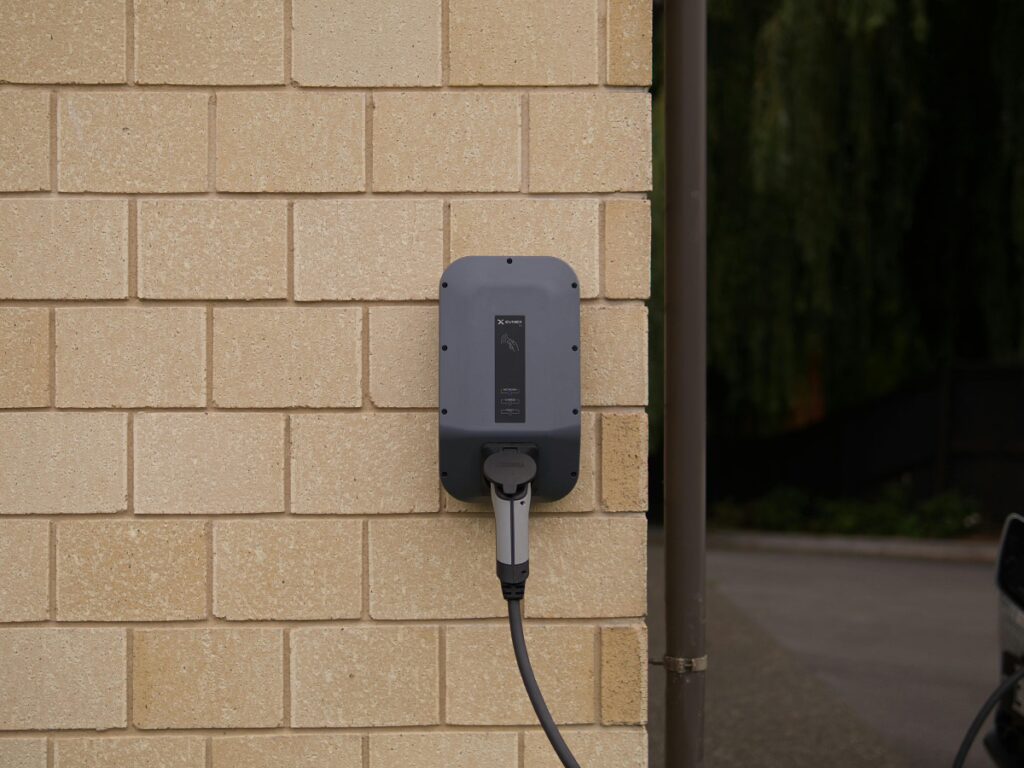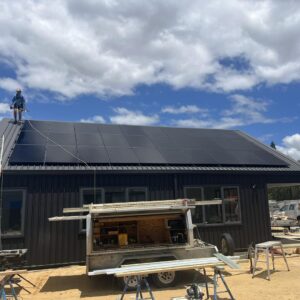As more Western Australians embrace solar energy, a growing number of households are considering how best to use their excess solar power: should you invest in a solar battery or an EV charger? With energy prices fluctuating and sustainability high on the agenda, this is more than a technical question; it’s about shaping your home’s energy future.
Both solar batteries and EV chargers offer unique benefits, but choosing the right one depends on your lifestyle, goals, and the way your renewable energy system is set up. In this article, we explore the key considerations around battery storage in WA, EV charging capabilities, and how to make the most of your solar setup.
How Solar Energy Can Be Used (The Basics)
When your solar panels generate electricity during the day, there are three main paths that energy can follow:
1. Powering your home directly in real-time.
2. Charging a solar battery, which stores power for use later (e.g., at night).
3. Charging an electric vehicle, ideally when the sun is shining.
If you don’t use or store the solar power, it gets exported to the grid, often for a much lower return than your cost of energy consumption. So, both battery storage and EV chargers aim to maximise self-consumption, thereby increasing the financial return and environmental benefit of your solar system.
For a complete look at battery options for homes, visit MaxSolar’s battery storage solutions designed specifically for WA conditions.
Battery Storage for Backup and Energy Independence
Battery systems are particularly appealing for homeowners who want backup solar power and increased energy independence. A battery system allows you to store excess solar energy generated during the day for use at night or during power outages. In WA, where grid reliability can vary regionally, especially in semi-rural areas, this added resilience is a huge advantage.
Key Benefits of Battery Storage:
1. Backup Power: Crucial during blackouts or storms.
2.Energy Cost Savings: Reduces grid dependency and evening power costs.
3. Time-of-Use Optimisation: Batteries can be programmed to discharge during peak tariff periods.
4. System Integration: Works well with hybrid inverters, offering more intelligent energy control.
Depending on your system setup, you may also consider DC vs AC coupling. DC coupling tends to be more efficient, but AC coupling is more flexible and easier to retrofit. Hybrid inverters often make this decision simpler by integrating charging, inverting, and energy management functions into a single unit.
EV Chargers: Smart Use for Daily Driving Needs
For EV owners, a solar-compatible EV charger makes a lot of sense. Rather than exporting excess power to the grid, you can use it to power your car, turning your rooftop solar into fuel. This can drastically reduce your petrol or charging costs, especially with solar-timed charging.
Advantages of EV Charging:
1. Low-Cost Mobility: Save thousands annually by using solar to power your car.
2. Cleaner Transportation: Zero emissions when powered by solar.
3. Future-Proofing: As EV adoption rises, charging infrastructure becomes essential.
4. System Integration: Smart chargers can be timed to only charge when solar is producing, enhancing cost savings.
For many, the decision between solar battery or EV charger is not binary. If your EV is regularly home during daylight hours, solar charging offers an immediate and ongoing benefit without the upfront costs of a battery.
But what if you can’t always charge during the day? In that case, a solar battery may still be needed to store power for charging your car in the evening.
Rebates and Long-Term Savings
While both technologies reduce grid reliance and improve energy efficiency, solar batteries and EV chargers differ in their cost structures and government incentives.
1. Battery System Costs: Typically from $5,000 for a 10KW installed but prices vary depending on capacity and equipment brand.
2. EV Chargers: Cost around $2,500 installed, with optional smart charging features.
Fortunately, WA battery rebates can significantly reduce your upfront investment in energy storage. These rebates are part of a broader state initiative to encourage home electrification and grid stability. To see if you’re eligible and learn how much you could save, check MaxSolar’s battery rebates information page.
On the other hand, EV charging offers lower initial costs and faster payback if you drive regularly. However, the value depends heavily on whether your EV is at home during solar production hours and the price you’d otherwise pay at a public charger or petrol station.
System Integration and Smart Energy Management
System integration is the key to maximising any solar investment. Both solar batteries and EV chargers benefit from intelligent energy management systems that coordinate solar production, consumption, and storage.
A properly integrated system can:
1. Prioritise household usage before storing or charging.
2.Enable remote control via apps for real-time management.
3. Respond to dynamic tariffs and forecast solar production.
4. Allow hybrid inverters to seamlessly operate with both storage and charging equipment.
Modern energy management platforms are becoming increasingly common in WA’s home solar setups, making it easier to combine both batteries and EV charging for optimal outcomes.
Choosing between a solar battery or EV charger ultimately comes down to usage patterns, energy goals, and budget. In some cases, adding one first and planning for the other later is a smart strategy—especially if you’re already investing in hybrid-ready technology.
For tailored advice and high-quality solar integration, turn to a trusted solar provider in Western Australia that offers system design, installation, and support for every stage of your renewable energy journey.
Which Should You Prioritise: Solar Battery or EV Charger?
Here’s a quick comparative summary to help clarify your priorities:
| Feature | Solar Battery | EV Charger |
| Primary Purpose | Store solar energy | Charge vehicle |
| Best For | Night-time energy use, backup | Daytime solar utilisation, mobility |
| Upfront Cost | High | Moderate |
| Government Rebates | Available in WA | Rare or limited |
| System Integration | Complex but powerful | Simpler to implement |
| Payback Period | 7–12 years | 3–6 years |
| Resale Value Impact | High | Moderate |
Future-Proofing Your Home
Looking ahead, the most future-ready homes in WA will likely include both solar battery storage and EV charging. This combination provides flexibility, energy independence, and maximised solar usage.
EVs themselves may eventually serve as mobile batteries, with vehicle-to-grid (V2G) and vehicle-to-home (V2H) capabilities. This means that installing smart infrastructure today will help future-proof your property for the evolving energy landscape.
Whether you start with a battery or a charger, ensuring compatibility and scalability is key. A staged approach, starting with the highest ROI, can ease the financial burden while setting the foundation for future upgrades.
Important Notes
Choosing between a solar battery or EV charger isn’t just about today’s needs, it’s about preparing for the future. In WA, where solar power potential is strong and government support is increasing, both technologies offer clear benefits. Start by identifying your immediate goals, whether that’s backup power, reducing petrol spend, or maximising solar self-use.
With the right advice and an eye on system integration, you don’t have to choose one or the other, you can build a smart, sustainable energy ecosystem over time.
Let professionals guide your transition to smarter energy. Learn more about battery storage options for WA homeowners at MaxSolar’s official site.
FAQs
Can I install both a solar battery and EV charger in my home?
Yes, and many WA homeowners are doing just that. A hybrid inverter can manage both systems efficiently, and your installer can configure priorities based on your lifestyle and solar output.
How much solar do I need to support a battery or EV charger?
This depends on your daily energy usage and the size of your battery or EV. As a rule of thumb, a 10kW solar system is a good option for homes adding storage or charging.
What if I’m not home during the day to charge my EV?
This is where a solar battery becomes valuable, it can store energy produced during the day for use in the evening, including EV charging.
Do EV chargers qualify for any rebates in WA?
Not currently. While some local councils may offer support, most state and federal rebates in WA focus on solar batteries due to their grid-stabilising benefits.
How do I know if battery storage is worth it for me?
Start with a solar audit. Look at your usage patterns, blackout frequency, and future energy goals. A reputable installer like MaxSolar can help you assess whether a battery aligns with your energy and financial objectives.






